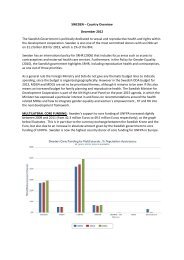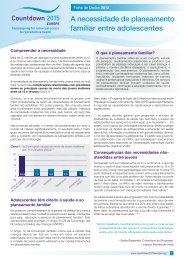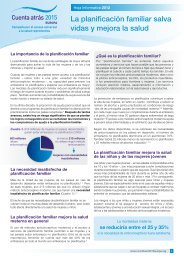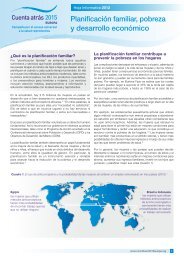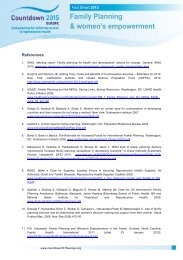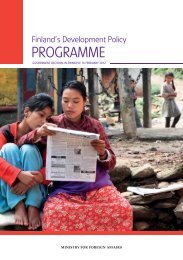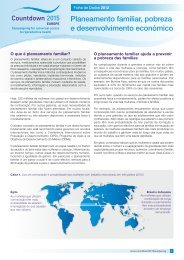The Unmet Need for Family Planning - Countdown 2015 Europe
The Unmet Need for Family Planning - Countdown 2015 Europe
The Unmet Need for Family Planning - Countdown 2015 Europe
You also want an ePaper? Increase the reach of your titles
YUMPU automatically turns print PDFs into web optimized ePapers that Google loves.
Limited access to services and supplies“In Zambia people want the contraceptives but can’t get them,particularly in rural areas. <strong>The</strong> pill is the easiest to get, some canaccess implants but only at level 2 or 3 hospitals (where theycan do minor surgeries).”– Holo Hochanda, Zambian Commission on Population andDevelopment delegation, BroadReach Healthcare, Zambia“In 2010 when we were producing a video documentary aboutfamily planning in the Kwahu South District in Ghana, we arrivedin one of the communities on the first day, and people said ‘Oh!Now we have people to talk to about this problem, which we can’ttalk about with anyone else.’ Our organization was recognizedby the community as the only family planning service provider,the only entity that reached out to them. This was a result offaced by the public health care system, including logistics, theGovernment can’t reach everyone, so we try to fill the gap. Forfive years people had no services in some of these communities,due to funding withdrawal from our organization. <strong>The</strong>y had noclinic in the community, and had to travel long distances to getreproductive health care.”– Nana Amma O<strong>for</strong>iwaa Sam,Advocacy Officer, Planned Parenthood Association of Ghana“Most of our work has been with young people, and it’s clear thatthey simply don’t have access to contraceptives. <strong>The</strong>re isn’t evenadequate in<strong>for</strong>mation about reproductive health. For example,we’ve been running projects <strong>for</strong> young people in three states,focusing on meeting demand <strong>for</strong> contraception. It’s very difficultto link them up with services because, at community level, familyplanning and contraception are not priorities. All these peoplecan get are oral contraceptive pills. And, not only are there nocondoms, but the service providers are not trained to in<strong>for</strong>m youngpeople how to use a condom correctly. It’s a vicious cycle to createa demand but then not have supplies to cater to that demand.”– Sarita Barpanda,Country Programme Advisor, Interact Worldwide, IndiaLegal restrictions“Because abortion is illegal, you can’t get one at health facilities,but if you walk in and you are bleeding, the doctors will finishthe abortion. So many girls go to unqualified doctors and pokewith anything they can find, and then the girl bleeds and goesto a real doctor. Some bleed more than others, and often thisis the source of women dying from unsafe abortion. Somedoctors pierce any part of the cervix, and some women losea lot of blood. Most often I saw young women coming in afterunsafe abortions -- women between the ages of 18 and 25.”– Dr. Moses Muwonge, M.D.,Health Logistics Consultant, UgandaContraceptives are too expensive <strong>for</strong> many users“Reproductive health commodities, such as contraception, arenot free in the Philippines, not even from Government clinics.Some local governments do make them available at a cost,but young people don’t have much income and are dependenton their parents until about age 24. So they simply can’t buycontraception. Also, if you are unmarried in the Philippines, it’sa taboo to have sex, so asking your parents <strong>for</strong> money to buycontraception is out of the question.”– Bryant Gonzales, Youth Coordinator,<strong>Family</strong> <strong>Planning</strong> Association of the Philippines“Getting access to transport is a challenge <strong>for</strong> many people.Commercial vehicles only travel on market days. And what’sthe guarantee that on that day you will have the money <strong>for</strong>the services or supplies you need? So the cost is not just theproduct, but the transport.”– Nana Amma O<strong>for</strong>iwaa Sam,Advocacy Officer, Planned Parenthood Association of Ghana“We had one government-provided family planning clinic inmy city, which was located in the compound of the City Hall.This was totally inaccessible to young people – they don’t dobusiness in the city! My idea of a youth centre is that it shouldbe accessible, maybe by locating it in a school or within ashopping mall … but in the City Hall?”– Bryant Gonzales,Youth Coordinator, <strong>Family</strong> <strong>Planning</strong> Association of the Philippineswww.countdown<strong>2015</strong>europe.org19







